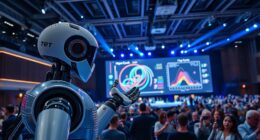AI isn’t set to wipe out every job. While millions may be replaced by automation, millions more will be created or transformed, leading to a net positive for employment. Many roles will change, especially in sectors like healthcare, legal work, and leadership, where human skills are essential. The overall impact depends on how industries adapt and how workers upskill. Stick around—there’s more to understand about how technology reshapes the workforce.
Key Takeaways
- While millions of jobs may be displaced, new roles will emerge, resulting in a net job gain by 2030.
- Many jobs involve tasks that AI can augment rather than fully replace, especially roles requiring empathy and judgment.
- The overall economy benefits from automation, with technology creating more jobs than it displaces.
- Certain sectors like healthcare, legal work, and leadership are less susceptible to complete automation.
- Skills training and adaptation are crucial, as high-skilled, AI-compatible roles will be increasingly in demand.

While AI is transforming many industries, it’s important to recognize that it won’t eliminate every job. The future of work isn’t about machines replacing humans entirely but about change and adaptation. According to the Future of Jobs Report, by 2030, around 92 million roles worldwide could disappear due to automation and AI. Yet, in a balanced view, about 78 million new jobs are expected to emerge, meaning the net effect is a significant job gain, not total displacement. Technology will create roughly 11 million new roles in some sectors, even as it displaces around 9 million others. For example, since 2000, automation has replaced 1.7 million manufacturing jobs, but new industries and roles have also formed to fill those gaps. The net effect of automation is a growing economy. In the U.S., nearly 65% of retail jobs are at risk of automation by 2025, yet other sectors are expanding, offsetting those losses. Despite 40% of employers planning workforce reductions because of AI, new roles still appear, especially in high-skill areas. About 30% of U.S. businesses replaced workers with AI tools like ChatGPT in 2025, with 40% prioritizing automation over human augmentation. Major companies like Microsoft and IBM have laid off thousands of employees due to AI adoption—Microsoft let go of 6,000, and IBM more than 8,000—primarily in roles like software engineering and HR. AI’s impact is most evident in industries like manufacturing, where MIT and Boston University estimate 2 million jobs could be lost by 2025, and retail, where 65% of roles might disappear. However, not all jobs are equally vulnerable. Nearly 31% of U.S. jobs could be fully automated by 2030, but about 60% will see tasks that can be improved or augmented by AI rather than eliminated. Roles requiring empathy, creativity, or complex decision-making—like healthcare, legal work, and leadership—are less likely to be fully automated because legal and ethical barriers slow the process. New industries, such as AI governance and digital ethics, are creating fresh opportunities. You’ll also notice shifts in entry-level positions. Nearly 40% of employers plan to cut jobs where AI handles repetitive tasks, often leading to lower wages for remaining roles. Meanwhile, employees in AI-augmented roles often accept lower pay, and the demand for highly skilled workers with advanced training increases. On a global scale, U.S. firms are expanding operations in countries like India to access affordable, skilled labor, which is a result of global economic shifts and intensifying international competition for white-collar roles. While the media often amplifies fears of AI taking over, the reality is more nuanced. Displaced workers tend to overestimate AI’s impact, and broader economic conditions contribute heavily to layoffs. Ultimately, AI’s role is to complement human effort, not replace it entirely—especially in fields where human traits like empathy and judgment remain essential.
Frequently Asked Questions
How Quickly Will AI Impact Different Industries?
You’re wondering how fast AI will impact various industries. The truth is, automation is already transforming manufacturing, with Asia risking 21% of jobs by 2026. Tech sectors see 92% of roles changing, and many white-collar jobs are being automated, with some companies cutting thousands of positions. Entry-level roles face rapid shifts, and within five years, nearly 40% of employers plan layoffs due to AI. The pace varies, but change is happening quickly across sectors.
What Jobs Are Most Resistant to AI Automation?
Think of resistance as a fortress built from human touch and intuition. You’re most protected in healthcare, where empathy and dexterity reign supreme, or in creative roles like storytelling and design that demand originality AI can’t replicate. Skilled trades and cybersecurity also stand strong, relying on physical skills and nuanced judgment. Your ability to adapt, innovate, and connect emotionally keeps you ahead of automation’s reach, making your job uniquely resilient.
Will AI Create More Jobs Than It Eliminates?
You’re wondering if AI will create more jobs than it eliminates. The answer is yes. Predictions show 97 million new roles by 2025, with significant growth in AI-related positions, especially for roles like AI engineers and content creators. While some low-skill jobs might be displaced, overall, AI drives job creation in emerging sectors. Skills like communication, collaboration, and design become more valuable, ensuring new opportunities for you in the evolving workforce.
How Can Workers Prepare for Ai-Driven Changes?
You can prepare for AI-driven changes by upskilling in AI-compatible skills, like certifications in tools such as ChatGPT. Focus on roles that need creativity, empathy, or critical thinking—areas AI can’t replace. Master AI tools to boost your productivity, and highlight tasks requiring human judgment. Stay adaptable by building hybrid skills, seeking remote opportunities, and exploring emerging sectors. These steps help you stay relevant in a transforming workplace.
What Are the Ethical Considerations of AI Replacing Jobs?
You should consider the ethical implications of AI replacing jobs, like fairness, transparency, and accountability. As AI systems can perpetuate biases and discriminate, it’s vital to advocate for responsible deployment and oversight. You need to push for regulations that guarantee AI benefits everyone, not just corporations. Prioritize transparency in AI decision-making and support initiatives that retrain displaced workers, promoting a fair and equitable workforce.
Conclusion
Remember, every cloud has a silver lining. AI may change how we work, but it won’t replace every job. Instead, it’ll create new opportunities and shift roles in ways we can’t always see now. Embrace the change with an open mind and a positive attitude. After all, the early bird catches the worm, so adapt quickly and stay ahead of the curve. Change is inevitable, but so is your ability to thrive in it.









